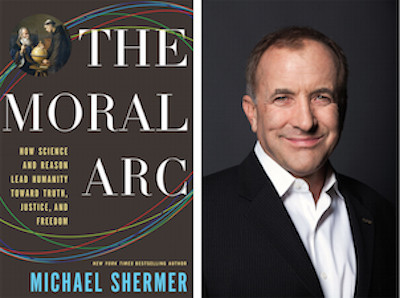The weekly update on the SPI Fellows
by Madeline Schussel
 SPI Fellow Michael Shermer, Skeptic magazine founder and author of The Moral Arc, interviewed with Rabbi Geoffrey A. Mitelman of the Huffington Post earlier this week. The content of their discussion, as well as of ShermerÔÇÖs book, was how scientific thinking has helped people to become both freer and more caring.
SPI Fellow Michael Shermer, Skeptic magazine founder and author of The Moral Arc, interviewed with Rabbi Geoffrey A. Mitelman of the Huffington Post earlier this week. The content of their discussion, as well as of ShermerÔÇÖs book, was how scientific thinking has helped people to become both freer and more caring.
Mitelman asked Shermer if he believes that science and religion are ÔÇ£inherently in conflictÔÇØ. Shermer explained that the source of friction is more specific: that ÔÇ£traditional theologyÔÇØ often counters the Enlightenment language of ÔÇ£natural rightsÔÇØ.
ÔÇ£
Shermer went on to clarify that the ideas in his book are not new, but rather, that they advocate a more rational take on ÔÇ£moralsÔÇØ that has been inherent in many cultural practices for centuries. He argues that problems as large as violence ÔÇ£oughtÔÇØ be treated as public health issuesÔÇömorally, the responsibility to prevent such epidemics falls upon everyone.
ÔÇ£Why?ÔÇØ Shermer postulates. ÔÇ£Because saving lives is moral. Why is saving lives moral? Because the survival and flourishing of sentient beings is our moral starting point.ÔÇØ
This Saturday, March 7th, Shermer and Mitelman will be continuing their dialogue on “The Genius of Good and Evil” as part of the 92nd St. Y’s 7 Days of Genius Festival in NYC. The Festival will be covered on YouTube, and in part, by MSNBC.
Earlier this week, SPI Fellow Steven Pinker contributed ÔÇ£Life HackÔÇØ #5 to a TIME Money article on how to ÔÇ£get richerÔÇØ. For better writing, Pinker advised readers (a) to avoid fancy words (that they might be using incorrectly), (b) to cut out unnecessary words, and always, (c) to revise (by getting a second opinion on whether word choices make sense to others).
ÔÇ£John Kerry once said, ÔÇÿThe President is desirous of trying to see how we can make our efforts in order to find a way to facilitate.ÔÇÖ What he meant was, ÔÇÿThe President wants to help.ÔÇÖ Much better.ÔÇØ
PinkerÔÇÖs new book is The Sense of Style, and recently, his book The Better Angels of Our Nature was the first of Mark ZuckerbergÔÇÖs 2015 picks for the popular group ÔÇ£A Year in BooksÔÇØ.
